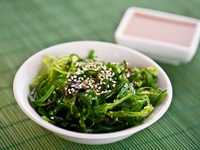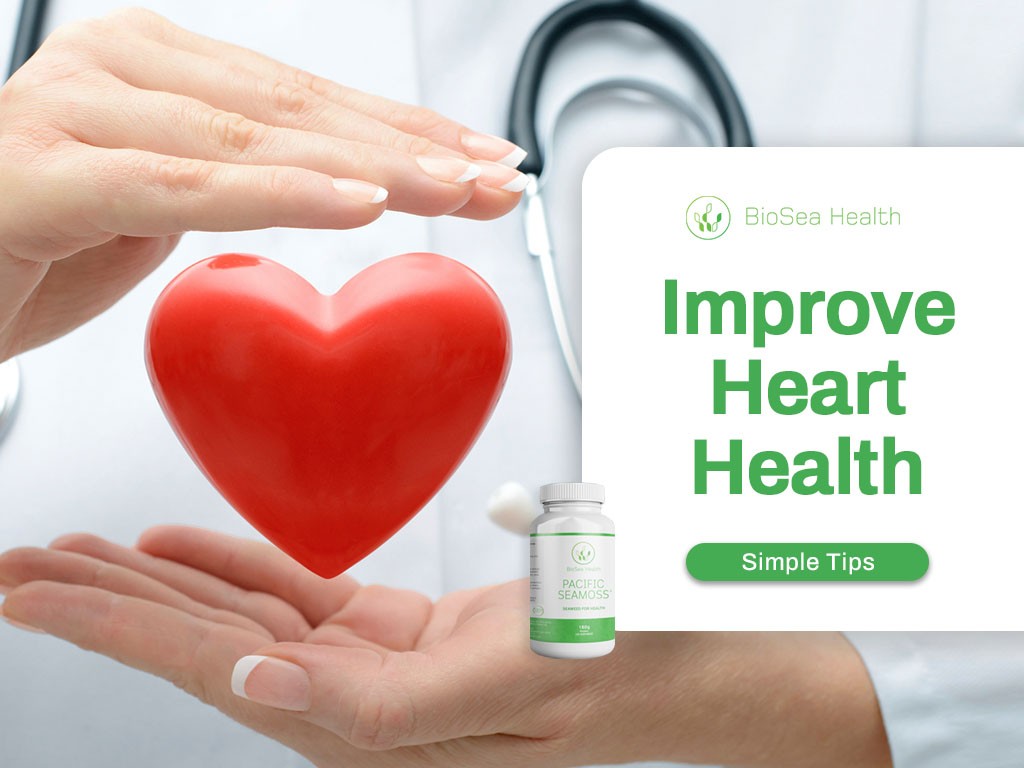The cardiovascular system is made up of the heart and all the arteries, veins and capillaries that are threaded throughout the body. The number one role is to deliver oxygen to every cell in the body. Get a healthy heart on seaweed. The heart is the strong pump that drives the oxygen delivery and beats from the first weeks after conception through to our last breath. No wonder heart health is so important.
Un-Healthy Heart – Cardiovascular Disease
The term “cardiovascular disease” can refer to a raft of heart and arterial diseases that affect this system. These range from aortic aneurysms to congestive heart failure, coronary artery disease and stroke. All these conditions have the same underlying causes that are either modifiable, like diet, or non- modifiable like genetics. We are all well educated about how to change our lifestyle to prevent heart disease. But despite major medical advances and public health campaigns over the past decades, Cardiovascular Disease remains the number one cause of death for both men and women in Australia. [1]
Health Food –> Healthy Heart
Science tells us that the solution may be easier and more readily available than the medical profession would have us believe. Nations with low rates of cardiovascular diseases, such as Japan, eat a diet rich in seaweed. The evidence is clear that on the Japanese diet of 1975 they had healthy heart on seaweed diet. This sea vegetable is rich in novel phytochemicals that create functional changes in the body when consumed regularly.
How Can Seaweed Help Prevent Cardiovascular Disease?
 1. Seaweed reduces blood pressure.
1. Seaweed reduces blood pressure.
The mechanism is not known, but several studies have shown that systolic blood pressure is returned to normal range in rats when seaweed is included in the daily diet for several weeks. [2]. One study compared seaweed intake with blood pressure medication and found regular seaweed consumption caused the same BP reduction as an ACE Inhibitor. [3]. The effect has been shown to be just as strong in humans, dropping high blood pressure to normal measures, while not lowering healthy pressure. [4] This suggests the seaweed is returning the cardiovascular system to health, rather than just dropping blood pressure in isolation.
2. Healthy heart on seaweed – prevents ventricular hypertrophy
When the heart muscle is placed under stress because of high blood pressure the body compensates by thickening the walls of the heart. This reduces the size of the chamber into which the blood flows. The heart is unable to effectively pump anymore eventually lead to heart failure. Studies have shown that seaweed prevents the hypertrophic thickening of the heart walls even in the context of a high fat diet. [3]
3. Healthy Heart on Seaweed prevents cardiac fibrosis
In any state of cardiac stress or disease, a structural protein, collagen, builds up in the heart muscle causing fibrosis – a hardening and enlarging of the heart muscle. This limits the ability of the heart muscle to contract and interferes with the electrical conduction that makes your heart beat regularly. Cardiac fibrosis is progressive and eventually leads to heart failure. Seaweed removes collagen from heart tissue independent of dietary and lifestyle changes. [2]
4. Seaweed Reduces Blood Lipids
Caused by a diet high in fat or genetic predisposition, high cholesterol, particularly bad LDL cholesterol, leads to arterial plaques the eventually block arteries, particularly the coronary arteries. These are the small arteries that run along the outside of the heart bringing blood supply and oxygen to the heart muscle itself. When these arteries are blocked the heart muscles stops functioning and may die – this is called myocardial infarction, commonly known as a heart attack. Seaweed has been shown to interfere with the normal mechanisms of lipid breakdown, preventing dietary fats from building up in the blood stream and causing arterial plaques.[2] One study showed seaweed was as effective as a statin medication in reducing cholesterol. [3]
5. Seaweed reduces inflammation
Most cardiac disease is ultimately caused by inflammatory processes in the body. Damage ranges from hardening of small injuries to the arteries caused by arterial plaques, or invasion of inflammatory cells into the heart muscle itself. Seaweed has a dual action to remove inflammation in the heart and the arteries. The prebiotic component of seaweed upregulates good bacteria in the colon which in turns sends anti-inflammatory molecules into the blood stream to reach the arteries and heart.[5] In a second, unknown mechanism, seaweed removes inflammatory cells that build up in the cardiac muscle from stress, western diet or age. [2]. The Japanese demonstrate that you get a healthy heart on seaweed.
Check out a detailed science review on Blood Pressure Control with Seaweed Dietary Supplement
References
[1] A. I. o. Health and Welfare, “Deaths in Australia,” AIHW, Canberra2019, Available: https://www.aihw.gov.au/reports/life-expectancy-death/deaths-in-australia.
[2] S. Wanyonyi, R. Du Preez, L. Brown, N. A. Paul, and S. K. Panchal, “Kappaphycus alvarezii as a food supplement prevents diet-induced metabolic syndrome in rats,” Nutrients, vol. 9, no. 11, p. 1261, 2017.
[3] Z. Eshak, “PROTECTIVE EFFECT OF Kappaphycus alvarezii ON THE HEART OF HYPERTENSIVE AND HYPERCHOLESTEROLEMIC INDUCED SPRAGUE-DAWLEY RATS,” Malaysian Journal of Microscopy, vol. 12, no. 1, 2016.
[4] J. Teas, M. E. Baldeón, D. E. Chiriboga, J. R. Davis, A. J. Sarriés, and L. E. Braverman, “Could dietary seaweed reverse the metabolic syndrome?,” Asia Pacific journal of clinical nutrition, vol. 18, no. 2, p. 145, 2009.
[5] I. Sekirov, S. L. Russell, L. C. M. Antunes, and B. B. Finlay, “Gut microbiota in health and disease,” Physiological reviews, vol. 90, no. 3, pp. 859-904, 2010.

